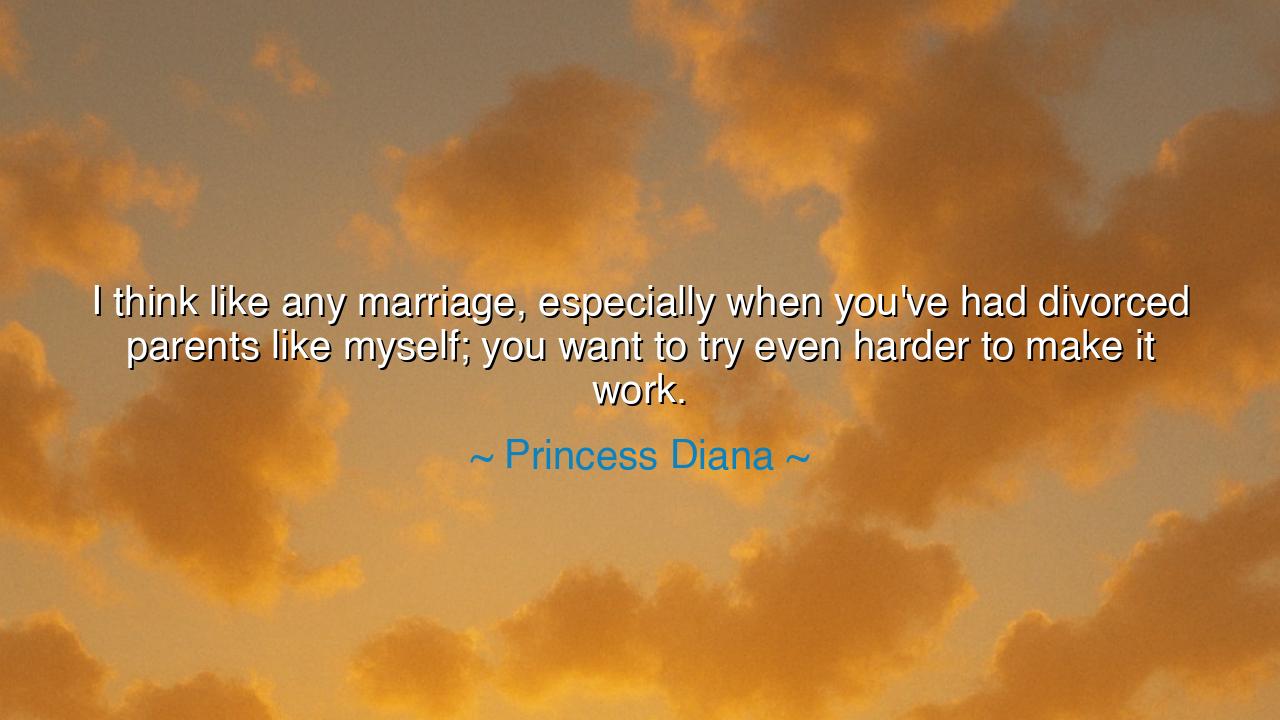
I think like any marriage, especially when you've had divorced
I think like any marriage, especially when you've had divorced parents like myself; you want to try even harder to make it work.






In the tender and sorrowful words of Princess Diana, we hear the echo of a heart that sought to love beyond its own pain: “I think like any marriage, especially when you've had divorced parents like myself; you want to try even harder to make it work.” These words, though gentle in tone, carry the weight of longing, hope, and heartbreak. They are spoken not from the throne of royalty, but from the depth of human vulnerability. In them, Diana reveals a truth as ancient as love itself—that those who have known the wounds of broken families often bear within them an unspoken vow: to heal in their own lives what once was shattered.
The origin of this quote lies in the tragedy and beauty of Diana’s own life. Born into a family marked by separation, she witnessed early the anguish that follows when love turns to dissonance. Her parents’ divorce left scars that shaped her understanding of relationships. When she entered her own marriage to Prince Charles, she carried not only her personal dreams but the silent determination of a child who had seen what failure looks like and swore to defy it. Her words reveal that eternal human impulse—to try harder, to hold together what the world seems determined to tear apart, to find meaning in endurance.
But Diana’s truth extends beyond her story. It speaks to the children of all broken homes, those who carry invisible burdens into their own unions. They become the ones who fight too long, forgive too much, and strive too earnestly, believing that if they can make their love endure, they will redeem not only themselves but the sorrows of their parents. In this way, Diana’s confession is not merely personal—it is universal. It reflects the longing of every soul that has felt the absence of love and vows, “I will not let this end as theirs did.”
Consider the story of Eleanor Roosevelt, who, too, endured the pain of betrayal in her marriage yet refused to let bitterness consume her. She turned her suffering into compassion, her disillusionment into service for humanity. Like Diana, she bore the wounds of love yet sought to transform them into something luminous. Both women remind us that even when love falters, the act of striving itself becomes sacred. To try, to care, to hope against despair—these are not signs of weakness but of courage.
Diana’s words also reveal a profound understanding of the fragility of human connection. To “make it work,” she says, is not a matter of magic or destiny—it is labor, devotion, and resilience. Love must be tended like a garden; without care, weeds of resentment will overrun the soil. Yet, even the most faithful gardener cannot control every storm. Diana’s tragedy lies in that truth—she gave herself fully to the effort, but love, like life, is a dance between two souls. When only one continues to move, the rhythm falters. Still, her determination to “try even harder” remains a beacon of sincerity—a testament to the sanctity of effort, even in the face of inevitable loss.
Her words also speak of the inheritance of pain, how the sorrows of one generation flow into the next. Children who watch their parents’ hearts break often grow into adults who fear both love and loneliness. They become warriors of affection—fighting not just for a partner, but for the restoration of faith in love itself. Diana’s struggle was not only with her husband, but with the ghosts of her own childhood. And in trying to build a lasting union, she was really building a bridge back to the little girl within her—the one who wanted to believe that love could last forever.
Let this be the lesson, O children of the heart: love is not saved by perfection, but by perseverance. To try harder is noble, but to know when to surrender is also wisdom. Heal, but do not chain yourself to the past. If you come from brokenness, do not let it define your destiny. Let it teach you compassion, patience, and the courage to communicate honestly. If you must fight for love, fight with gentleness, not with pride. And when love can no longer stand, let your parting be marked not by bitterness, but by gratitude for what was once beautiful.
Thus, in the spirit of Princess Diana, whose love was both luminous and tragic, we learn that the truest nobility lies not in crowns or vows, but in the courage to love despite fear. To those who have seen love fail and yet choose to believe again—you are the healers of your lineage. Try harder, yes—but also love wiser. For in every sincere effort to mend what is broken, the heart fulfills its most divine purpose: to turn pain into compassion, and memory into mercy.






AAdministratorAdministrator
Welcome, honored guests. Please leave a comment, we will respond soon